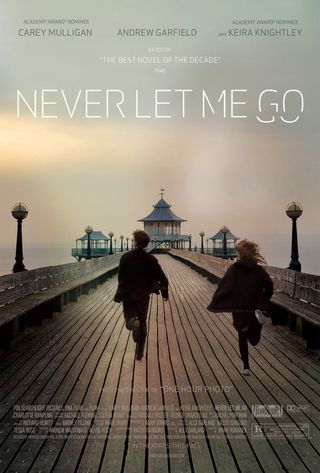Never Let Me Go
I saw this film in a Washington suburban cinema last year, at a loose end one evening and unable to find anything else I wanted to watch. I chose it more because of what it wasn't than because of what it was. And there wasn't much on that week, despite the many multiplexes in the Maryland suburbs. I hadn't then read the book, and wasn't much of an enthusiast for Kazuo Ishiguro. I thought, and still think, that 'The Remains of the Day' simply doesn't justify the enthusiasm ladled over it by the fashionable world of books, and the film of 'Remains' (I don't think this is in the book) contains an unutterably stupid and unhistorical scene involving Neville Chamberlain. That film, in general, was plain silly, saved only by its stellar cast. Perhaps someone will one day explain to me what its point was.
So I really had no idea what to expect from 'Never Let Me Go'. Perhaps this was a good thing. It took me a little while to grasp that the characters were all clones, destined to have their organs fatally harvested - and I was immediately reminded of a 2005 film called 'The Island', one of many not-very-successful movies I have seen on an aeroplane, in which the same is true, though in that film each clone is a direct copy of a human, who will benefit from the clone's death. And the truth about their fate is concealed from the clones. I suspect 'The Island' was too dispiriting to be big box-office, despite the presence of Scarlett Johansson among the clones.
I now wish I had read the book first. Without having done so, I suspect anyone who watches it will simply fail to grasp large chunks of what is going on until it is a bit late to appreciate them. So I suppose I shall now have to go and see it again.
The plot is in fact quite absurd. The world portrayed here is a sort of 1980s Britain, in which cloned children are bred, raised and then gradually plundered for their organs, so that they live more or less as humans until their twenties and are then slowly killed off, operation by operation. This procedure is surrounded by euphemisms. Somehow or other, these clones are persuaded to accept their fate, and not to destroy their valuable bits and pieces by smoking or drinking (promiscuous sex is apparently OK, because they are all sterile, though I should have thought there were risks here too). This would surely be almost impossible. Why on earth wouldn't they, knowing they were doomed, indulge themselves as much as possible unless they were actually kept locked away from temptation (as they are, more believably in 'The Island')? Why wouldn't they run away, and form rebel colonies?
Also, why bother maintaining a sort of idyllic rural boarding school for a small number of these clones, so that they can be educated to a high standard and socialised as if they were going to be normal citizens, when they all know this is not to be? The conceit is barmy.
And how could normal society carry on functioning with this horror taking place in its midst? Even the dimmest and most anti-religious person, knowing that humans were being farmed nearby for their organs, and then robbed of these organs until they died, would surely raise an objection?
It's true that we marginalise the old in horrible care homes, and massacre unborn babies in abortion clinics. But these victims don't generally wander round our city streets, or drive cars. They are easily kept out of sight because they are immobile and weak. But these clones roam around the country, where they are supposed to evoke a sort of pitying disgust or horror, but one that doesn't focus into action of any kind.
So, as dystopias go, this is one of the least believable I've ever come across.
If it works at all, it works as a metaphor for a generation of children largely abandoned by their career-obsessed, divorced parents, a generation who don't really know what a parent is, or a home, or brothers and sisters, or ever expect to become parents themselves. The awful bleakness at the end of the book (the film, again, doesn't do it so well) might be seen as the awful bleakness of such a world.
If that is what it is (and for a suggestion that it might be, you'll have to read the book for Cathy's explanation of her heartbreaking misunderstanding of the song 'Never Let Me Go', never properly dealt with in the film, as I recall) then it's quite powerful.
If you want to comment on Peter Hitchens, click here and scroll down.
Peter Hitchens's Blog
- Peter Hitchens's profile
- 296 followers




